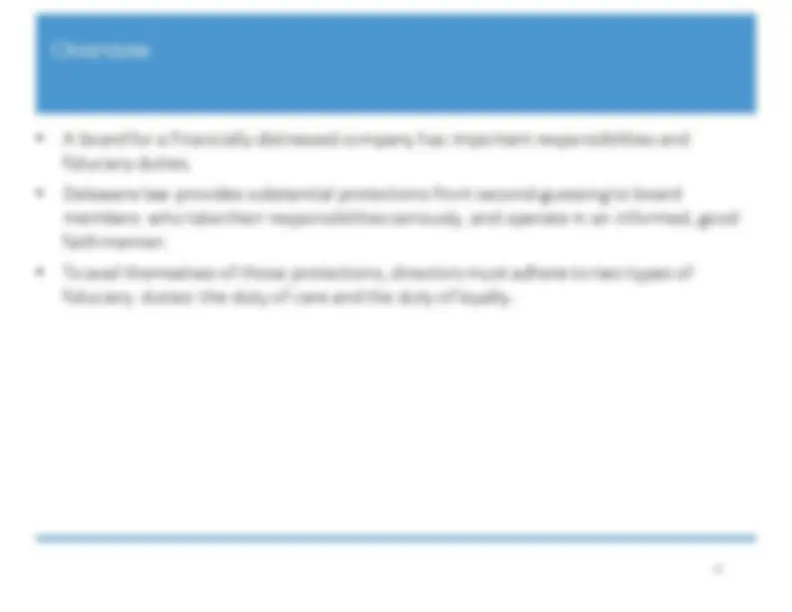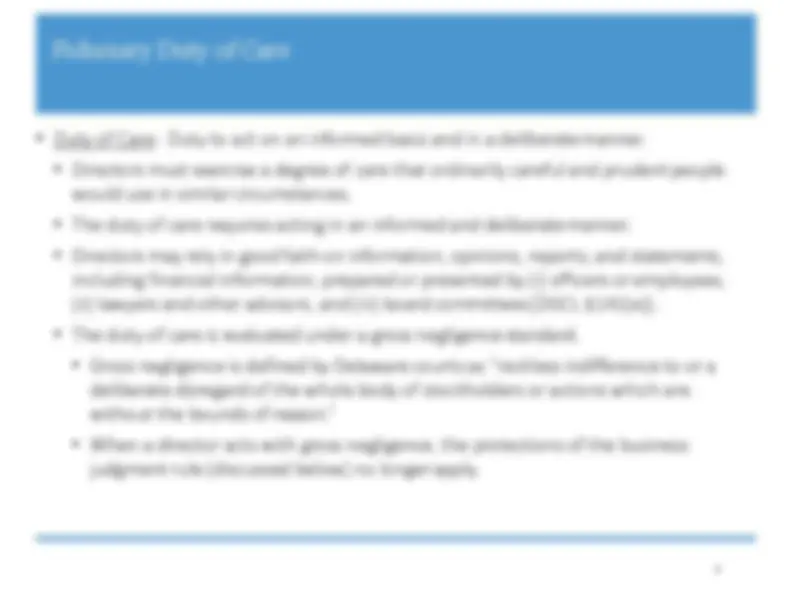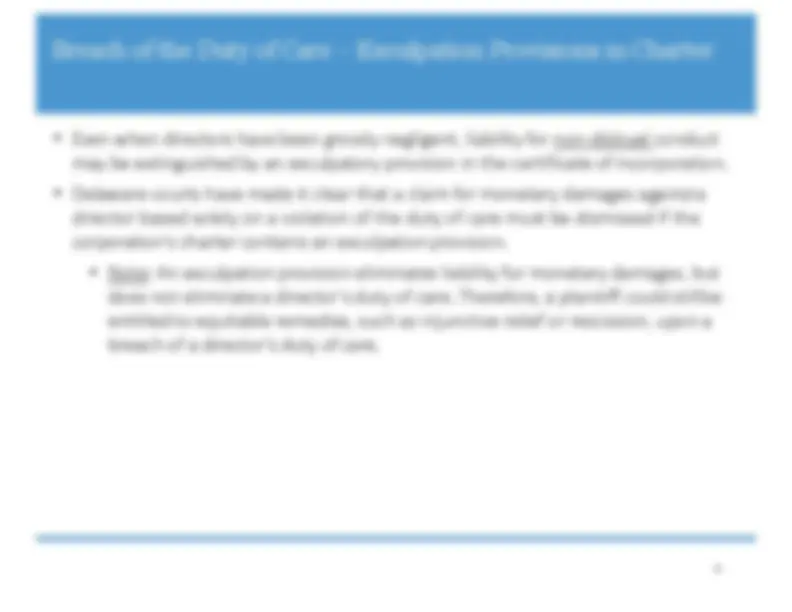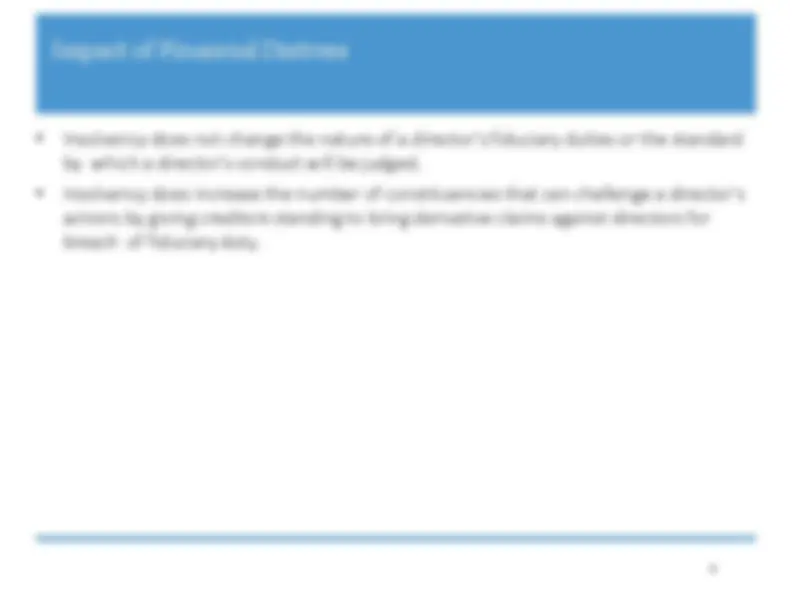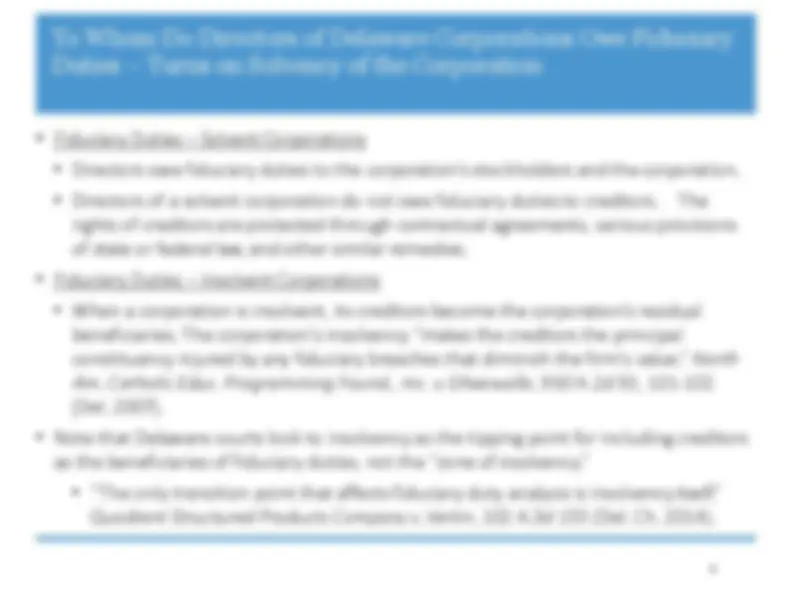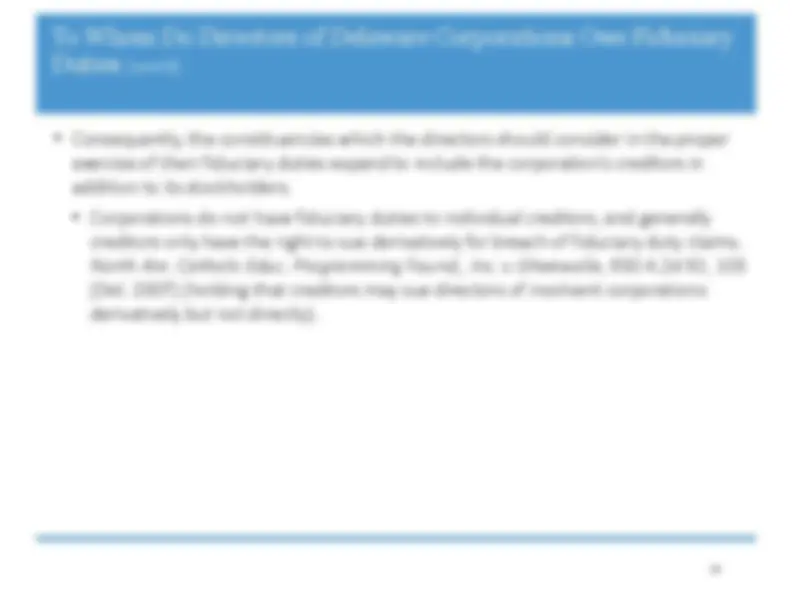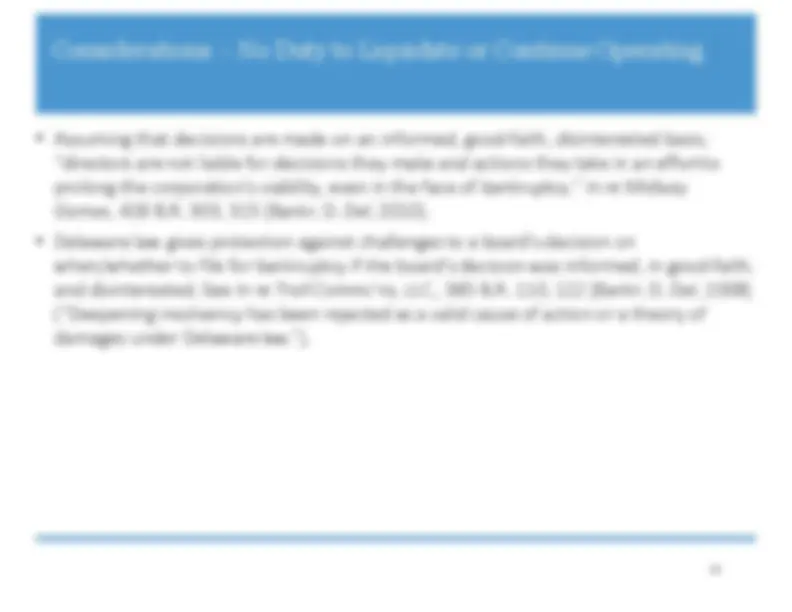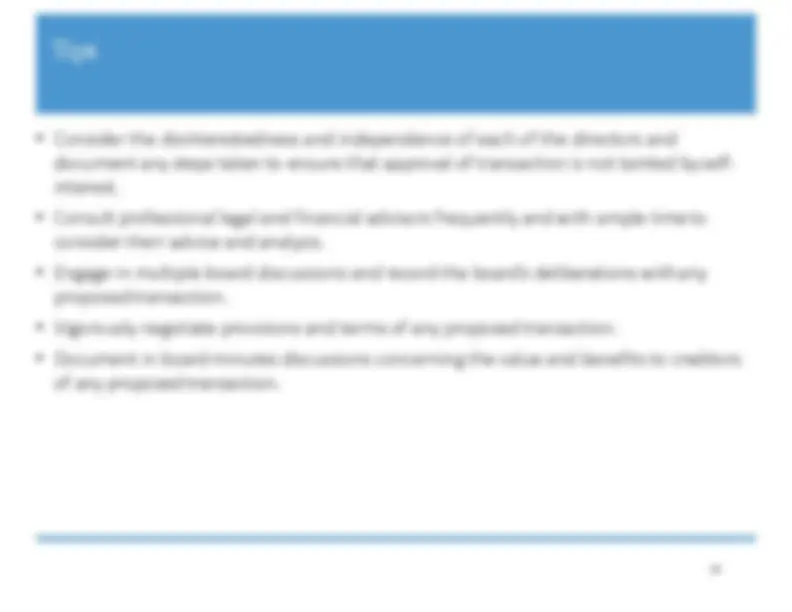Download Understanding Fiduciary Duties in Financially Stressed Companies: Care and Loyalty and more Lecture notes Law in PDF only on Docsity!
Fiduciary Duties of Directors of a Financially Stressed Company
Robert A. Klyman Matthew G. Bouslog March 2020
- This is preliminary briefing on the fiduciary duties of the directors of a financially stressed corporation.
- It is not intended to touch on all aspects of fiduciary duties and corporate governance in the context of a board's decision-making for a financially stressed corporation.
- The directors may wish to have a follow-up presentation in connection with any transaction that they may consider.
Overview
- Duty of Care: Duty to act on an informed basis and in a deliberate manner.
- Directors must exercise a degree of care that ordinarily careful and prudentpeople would use in similar circumstances.
- The duty of care requires acting in an informed and deliberatemanner.
- Directors may rely in good faith on information, opinions, reports, and statements, including financial information, prepared or presented by (i) officers or employees, (ii) lawyers and other advisors, and (iii) board committees (DGCL §141(e)).
- The duty of care is evaluated under a gross negligence standard.
- Gross negligence is defined by Delaware courts as “reckless indifference to or a deliberate disregard of the whole body of stockholders or actions which are without the bounds of reason.”
- When a director acts with gross negligence, the protections of the business judgment rule (discussed below) no longer apply.
Fiduciary Duty of Care
- Even when directors have been grossly negligent, liability for non-disloyal conduct may be extinguished by an exculpatory provision in the certificate of incorporation.
- Delaware courts have made it clear that a claim for monetary damages againsta director based solely on a violation of the duty of care must be dismissed if the corporation’s charter contains an exculpation provision. - Note: An exculpation provision eliminates liability for monetary damages, but does not eliminate a director’s duty of care. Therefore, a plaintiff could stillbe entitled to equitable remedies, such as injunctive relief or rescission, upon a breach of a director’s duty of care.
Breach of the Duty of Care – Exculpation Provisions in Charter
Breach of the Good Faith Element of Duty of Loyalty (Cont’d)
- Personal liability for breaches of the duty of loyalty (including not acting in good faith, regardless of a personal financial interest in the transaction in question) cannot be exculpated by provisions in a company’s charter documents.
- Indemnification is not available for breaches of the duty of loyalty or for acts not in good faith.
Breach of Duty of Loyalty
Exculpation and Indemnity
- Insolvency does not change the nature of a director’s fiduciary duties or the standard by which a director’s conduct will be judged.
- Insolvency does increase the number of constituencies that can challenge a director’s actions by giving creditors standing to bring derivative claims against directors for breach of fiduciary duty.
Impact of Financial Distress
- Consequently, the constituencies which the directors should consider in the proper exercise of their fiduciary duties expand to include the corporation’s creditors in addition to its stockholders.
- Corporations do not have fiduciary duties to individual creditors, and generally creditors only have the right to sue derivatively for breach of fiduciary duty claims. North Am. Catholic Educ. Programming Found., Inc. v. Gheewalla , 930 A.2d 92, 103 (Del. 2007) (holding that creditors may sue directors of insolvent corporations derivatively but not directly).
To Whom Do Directors of Delaware Corporations Owe Fiduciary
Duties (cont’d)
Delaware law recognizes two tests: the balance sheet test and the cash flow test. Because the tests developed from common law, they are not entirely clear.
- Balance sheet test: generally, liabilities in excess of reasonable market value of assets; but some courts add no reasonable prospect that the business can be successfully continued in face thereof; other courts hold that there no requirement of irretrievable insolvency.
- Unless liquidation is imminent, assets are valued at fair market value on “going concern” basis, assuming conversion to cash over reasonable time frame.
- Liabilities are counted at face value.
- Contingent liabilities are counted but must be discounted by the probability of their occurrence.
- Generally, liquidation costs, including pension plan termination liability, are not counted.
When is a Corporation Insolvent under Delaware Law?
Balancing competing interests:
- When a corporation is distressed or insolvent, the interests of creditorsand shareholders may diverge.
- Directors should choose a course of action that they believe best serves the corporate enterprise rather than particular stakeholders.
- In deciding whether to continue business or liquidate, the directors must seek to maximize the insolvent corporation’s long-term wealth creating capacity.
- When directors of an insolvent corporation make decisions that increase or decrease the value of the firm as a whole and affect providers of capital differentlyonly due to their relative priority in the capital stack, directors do not face a conflict of interest simply because they own common stock or owe duties to large common stockholders.
Considerations – Competing Interests
- Assuming that decisions are made on an informed, good-faith, disinterested basis, “directors are not liable for decisions they make and actions they take in an effortto prolong the corporation’s viability, even in the face of bankruptcy.” In re Midway Games , 428 B.R. 303, 315 (Bankr. D. Del. 2010).
- Delaware law gives protection against challenges to a board’s decision on when/whether to file for bankruptcy if the board’s decision was informed, in good-faith, and disinterested. See In re Troll Commc’ns, LLC., 385 B.R. 110, 122 (Bankr. D. Del. 2008) (“Deepening insolvency has been rejected as a valid cause of action or a theory of damages under Delaware law.”).
Considerations – No Duty to Liquidate or Continue Operating

